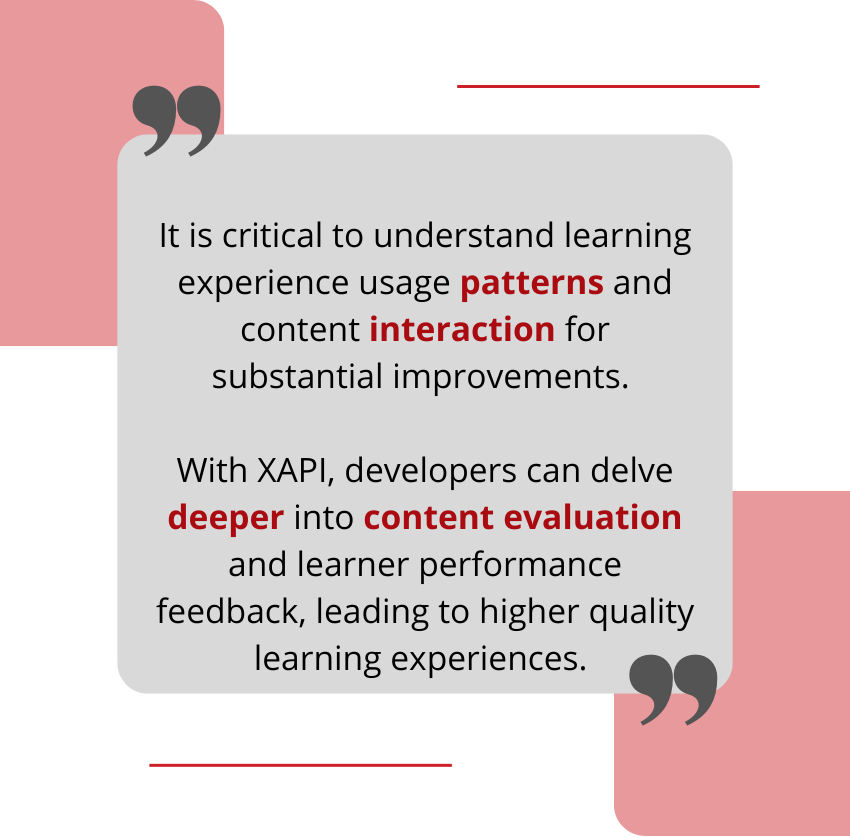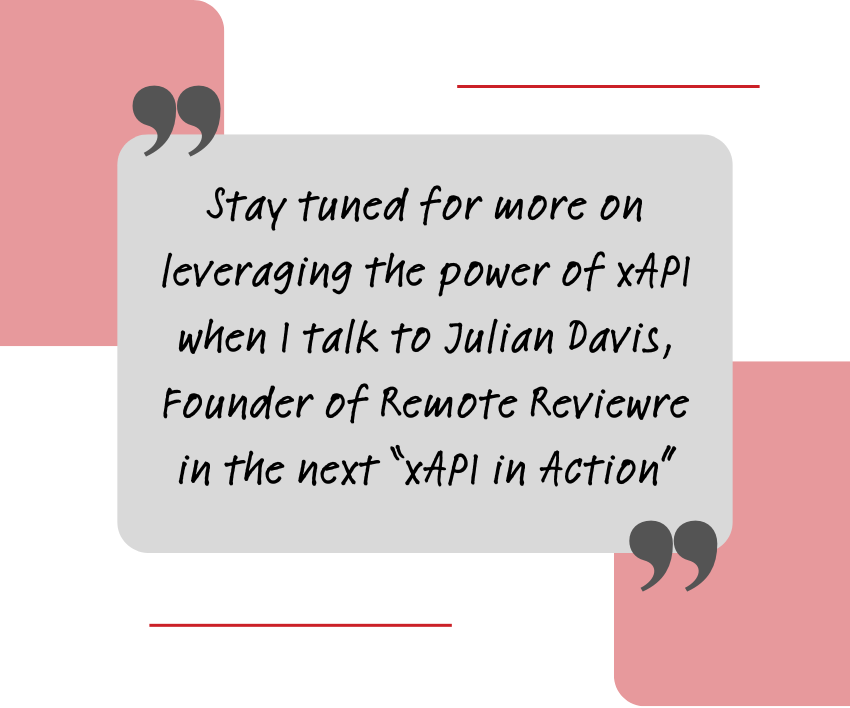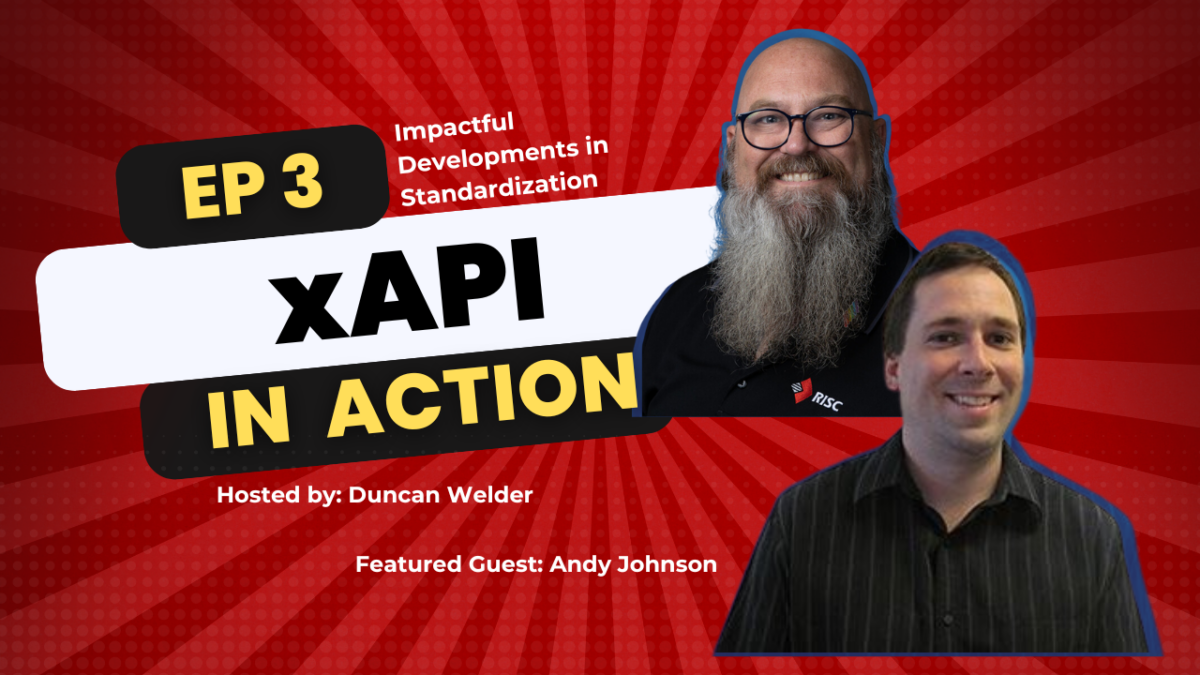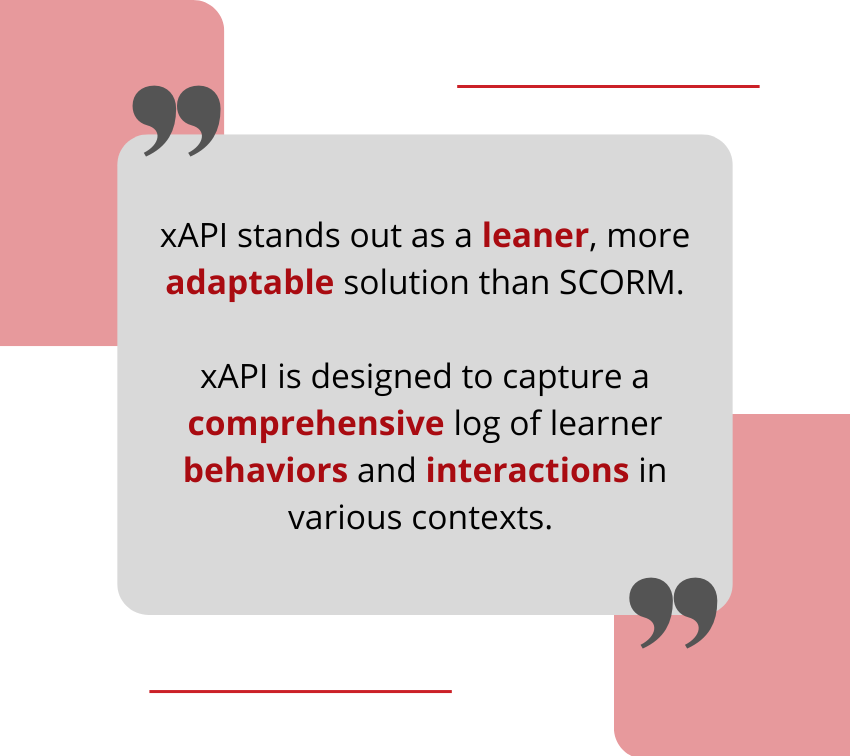Impactful Developments in xAPI Standardization
In our third episode of ‘xAPI in Action’ we take a deep dive into the fascinating world of xAPI standards development with Andy Johnson from the Advanced Distributed Learning Initiative. Duncan and Andy shed light on the community-driven process behind xAPI’s standardization and its subsequent transition to the IEEE for ongoing management and enhancement.
The Intersection of Technology and Learning
Data drives decision making. In the ever-evolving landscape of educational technology, it is critical to stay abreast of the latest trends and innovations that are shaping the future of learning and development. This is particularly true now as we shift away from the traditional confines of SCORM and begin realizing the benefits of the Experience API, commonly referred to as xAPI. I recently had the opportunity to engage in a thought-provoking discussion with a leading figure in the learning standards space, Andy Johnson. Our conversation centered around xAPI and how the holistic view of learning activities xAPI allows is revolutionizing how learning experiences are designed, tracked and analyzed.
The Role of ADL and the Birth of xAPI
Andy Johnson, a long-time, key member of the Advanced Distributed Learning (ADL) initiative, brings to the table extensive knowledge and experience in leveraging technology to optimize training and education within the government and military sector. Andy provided an in-depth look at the complex challenges that necessitated the development of technical standards in the learning space, as well as the innovative solutions that emerged as a result. A key focus of the ADL’s development effort around xAPI is interoperability. Andy’s insights into the origins of xAPI highlighted the criticality of taking a standardized approach to capturing and understanding learners’ interactions across various platforms and experiences. By providing a common syntax for recording learner data, xAPI ensures that data can be moved from source-to-source with confidence. Establishing a common, curated vocabulary further ensures that the meaning of an xAPI statement is the same to every person or application that “reads” it.
A Community-Driven Approach to Innovation 
One of the most fascinating aspects of xAPI’s development is the collective effort and input from a diverse community of practitioners, developers, and stakeholders. Andy discussed the importance of this community-driven approach, which has been a driving force in refining and enhancing the standard. The ADL hosts PlugFests where practitioners can work together using xAPI and the xAPI Cohort brings in people from around the world to collaborate on project teams that further enhance the specification.
Andy also explained the transition of xAPI to the IEEE standards group, a move that ensures the standard will continue to be maintained and evolve with the active participation of the community. The ADL is a research organization that helped define the specification but adoption by the IEEE, an International Standards body, ensures xAPI’s implementation and growth. The establishment of IEEE working groups is a key strategy for fostering engagement, adoption and ensures that xAPI remains relevant and effective in meeting the needs of the industry. With the IEEE involved, different working groups now concentrate on specialized areas such as learning activities and learner profiles. This collective effort paves the way for xAPI to nestle comfortably into the fabric of learning technologies, ensuring long-term maintenance, open-source accessibility, and general adoption. xAPI 2.0’s foresight in maintaining backward compatibility ensures a seamless transition for existing systems.
xAPI 2.0: Striving for Consistency and Context
Our conversation took a deep dive into the significant updates introduced with xAPI 2.0. This latest iteration of the standard focuses on improving consistency in how data is recorded and handled. xAPI 2.0 addresses earlier challenges such as discrepancies in timestamps and time zones. These enhancements are vital for the accurate tracking and analysis of learning data. Furthermore, xAPI 2.0 introduces new elements such as context groups and context agents, which provide a richer layer of contextual information about learners and their relation with the learning environment. This additional data allows for a more detailed and nuanced understanding of the learning process. This deeper understanding enables learning experience designers to tailor their approaches to better meet individual learner needs. At the same time, this insight helps organizations make data-informed decisions based on employee performance.
Conclusion: The Collaborative Future of Standard Development

The discussion Andy Johnson sheds light on the collaborative and iterative nature of developing standards like xAPI. It’s evident that the evolution of xAPI is an ongoing process that depends on the collective contributions and expertise of professionals across the learning and development field. The need for this commitment to continuous improvement and the dedication to upholding the integrity of the standard are what will propel xAPI forward, ensuring it remains a vital tool for enhancing the effectiveness of learning experiences.
Catch the replay of this episode on our YouTube channel. Want to learn more or become a contributor to xAPI in Action? Contact RISC today.


